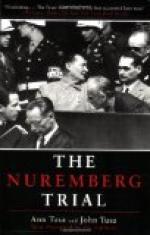|
This section contains 594 words (approx. 2 pages at 300 words per page) |

|
Many Allied officials, including England's Winston Churchill and Russia's Joseph Stalin, would have been happy to summarily execute Germans captured after the war. In the short-run, such retribution might have been satisfying and would have met with little opposition from a revengeseeking public, but other officials, especially Justice Robert H. Jackson, the U.S. chief prosecutor at the Nuremberg Trial, believed this would be a tragic mistake. Jackson believed the Germans should be given the very type of trial they denied their opponents—one that was fair and open.
Ultimately, the four major powers—Great Britain, France, the Soviet Union, and the United States—decided to put the Germans on trial with the understanding that a fair trial implied that some or all could escape punishment if the evidence did not prove their guilt. Of course, given the amount of...
|
This section contains 594 words (approx. 2 pages at 300 words per page) |

|




